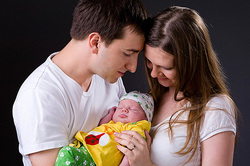 Postpartum depression is an insidious enemy of a happy motherhood. In the trap of this disease are almost 20% of the fairer sex, many are not even aware of it. What is dangerous is this condition and what you can do in order to get rid of it? Postpartum depression is an insidious enemy of a happy motherhood. In the trap of this disease are almost 20% of the fairer sex, many are not even aware of it. What is dangerous is this condition and what you can do in order to get rid of it?
The key thing to understand is not a whim but a problem that requires a serious relationship, because it negatively affects not only the fairer sex, but also on the baby, and the atmosphere in the family as a whole. Based on the severity of the symptoms, recognize the 3 degree painful conditions: postpartum sadness, specifically depression and postpartum psychosis. And if with the first 2 it is quite possible to cope on their own or with the help of loved ones, in the latter case, the necessary health professional - the sooner the better. What signs should make you think?
Excessive tearfulness, anxiety
Manifested as postpartum sadness. Commonly this condition go away on its own after a few weeks, if the fairer sex and not enough resting perenapravljaetsja. What if relatives do not differ in insight, and in no hurry to surround a young mother care? Not to close themselves, not to cherish resentment, and ask for help. Ideally the mother should be the 1st time to do a little one and themselves. If the situation can't be avoided, then you should lower the bar: proper rest is much more important than starched linens or 3 course meal.
The feeling of guilt, panic, irritability
Coupled with anxiety, chronic fatigue and mood swings, anxiety and irritability - "traditional" post-partum depression. A lady may worry for nothing, to doubt that he will perfectly take care of the baby. Often she feels abandoned, notes with horror that feels no affection for your child, blames himself, and this only escalates the situation. Alas, the young ladies in this state almost never ask for support from professionals because they are afraid of condemnation. They love to hide the problem, which gradually becomes chronic.
Actually postpartum depression can be overcome without the support of experts. The recipe is simple: take more rest, pay attention to not only the child, but also yourself, don't give up the small pleasures of life in the form of excellent books, stylish dress, favorite music, walking.
Resistance to change in their appearance
The female body is undergoing a substantial metamorphosis in pregnancy and childbirth: it can accumulate the extra weight, have stretch marks. Not everyone is taking the change philosophically, for some women it becomes a real disaster. They are ashamed of their appearance, you feel unattractive and unwanted. Well, if there is someone patient enough who's gonna convince them otherwise. There is also another way is to allocate a few hours a week, which the lady will be able to devote only to yourself. A trip to your favorite hairdresser, manicure, massage or yoga do amazing things. With an attractive haircut a few extra pounds to survive much easier.
Aversion to sex
At least half of the ladies the 1st time after childbirth sees sex as heavy duty. Presumably 18% difficulties in the intimate sphere drag on a year or more. The reasons may be different, from hormonal disruption, pain, fatigue to normal. Immediately after birth it happens natural attenuation of female sexuality. As if the nature gives a chance to the body to recover, and the fairer sex to feel like a mother. Despite the fact that intimate life is limited for some time, the lady might get emotional pleasure from intercourse with her husband, hugs, kisses. A careful and patient regarding libido quickly restored.
Unexpected bouts of anger aimed at the baby
These occurrences are not very common and distinctive for postpartum psychosis, but a clear diagnosis is only the doctor. The condition occurs due to hormonal failure in the body, is dangerous because of the fairer sex sometimes control their behavior and can harm the baby or yourself. Better care - making an appointment to see a psychiatrist, a young mother may need medication.
sections: Society
|